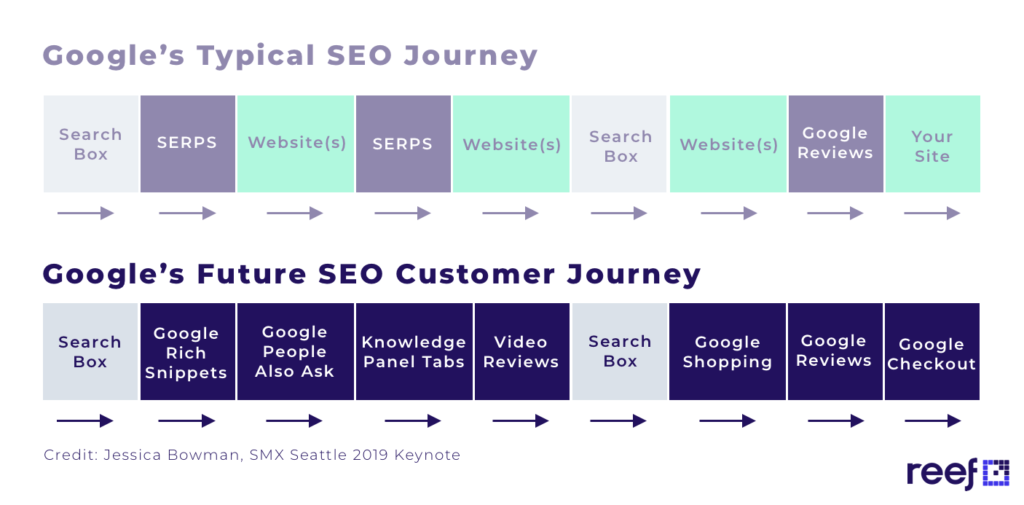I was honoured to join thousands of search marketers from across the globe at SMX Advanced, Seattle, in June as a finalist for the Search Marketer of the Year 2019 award. As the search marketing royalty and rabble converged to discuss the changing nature of SEO, The Bell Harbour Convention Centre in the heart of Seattle was buzzing with activity for three exciting days.
The result was a line-up of insightful panels and presentations, which we’ve gleaned through to highlight six game-changing SEO takeaways. Read on to know what’s changing in the SEO landscape and how you can use it to gain a competitive advantage online.
1. Search Results Pages as we Know Them are About to Change
To veteran SEOs, this won’t come as a surprise. Search engine results pages (SERPs) are always changing, right? It’s how Google leverages additional advertising revenue, provides new experiences for users, and leaves us SEOs with new modules and features to optimise for. According to Jessica Bowman, Editor at Search Engine Land, we’re about to see some real changes, and very soon.
“Google will handle the entire booking and purchase transaction,” she said in her keynote presentation.
Bowman calls it the “Google everything store and library”. This is a future where a user query can be answered on the SERP itself. We’ve already seen this trend emerge with Featured and Rich Snippets, but there’s still more to come.
The launch of Google Express, an Amazon-esque ecommerce store within the SERP, places the search engine as a stakeholder in the conversion stage, rather than being a mere information provider.
This is how Google’s SEO customer journey is predicted to change:

How will this affect SEOs? Well, Google will no longer be the search engine we’ve come to know, but it’s not all doom and gloom.
Bowman assured us that optimising for modules like People Also Ask and Featured Snippets can offset this change. Organic results also won’t be going away anytime soon, which means there’s still value in holding that precious real estate in SERPs.
2. Content Authority and Trust Will Continue to be Relevant Ranking Factors
Fresh might not always be the best, but the most authoritative and trustworthy sources will continue to achieve the best performance in search.
“It has to be an outstanding and authoritative conversation,” said Bowman.
This raises a great point:
How can SEOs write more authoritative and trustworthy content, particularly for smaller or clients or less-known organisations?
Well, we’ve got good news, it’s possible.
To increase the authority of your content, Bowman says you need to use the language of the authorities on the topic. Review what the highest ranking competitors are saying, but go deeper.
As SEOs we naturally go for the keywords when reviewing competitor content, but how are they positioning themselves as the authority? What terminology do they use? Who do they reference? Answering these questions may help improve the authority of your next blog post.
3. Don’t Worry Too Much About Google Updates
Google has the search community shaking in our boots every time they release an update. Barry Schwartz, News Editor at Search Engine Land, reassured us that despite releasing thousands of updates every year, very few of them actually affect rankings.
Those that do affect rankings aren’t targeting individual practices as was the case with Hummingbird and Penguin. Google has lately been concerned about two things: generating advertising revenue and the efficiency of its servers. Google doesn’t want to waste its resources indexing content that takes too long to load.
From an algorithm perspective, yes some updates do alter the way Google indexes our content. Schwartz said the only way to counter this is to “build a website that Google would be embarrassed not to rank for relevant keywords.”
In other words, follow SEO best practice, engage in content marketing, keep your website technically sound, and build your backlink profile.
4. Don’t be Misled by the Bounce Rate
The bounce rate is a metric that many SEOs and clients misunderstand. First, let’s clarify that a “bounce” occurs when a user accesses one page on your site, but performs no other action. This isn’t always a bad thing.
Marvin questioned how many SEOs and digital marketers use the metric: “What is the goal of the page? If the goal is for someone to pick up the phone and call, who cares if the bounce rate is high.”
To accurately read the bounce rate, you need to take into account what pages you’re looking at, the conversion goals on those pages, and if this is actually something you need to worry about. Your bounce rate may be driven up by your Contact Us page, and if your site is generating quality leads through this page, this isn’t a bad thing.
The key takeaway: a high bounce rate isn’t always a bad thing, and a low bounce rate may not be a good thing. You need to dig deeper to understand what’s really happening on your site.
5. Content Freshness isn’t Always a Relevant Ranking Factor
It’s well known to SEOs that freshness is a key ranking factor, but it isn’t always as important as we might think. When we’re assessing “freshness” and deciding whether to update existing content or publish a new piece, we need to consider how important recency is to the conversation.
Panel speaker Ginny Marvin, Third Door Media’s Editor-in-Chief, asked us a critical question: “Does the query deserve freshness?”
The room was left to ponder this question for a few seconds before Marvin hit us with some examples:
“If I’m searching about blue whales, that might not warrant freshness, but best protein bars 2019 might.”
It’s all in the query, literally. For keywords that are time-specific, freshness will be an important ranking factor. On the other hand, well-optimised evergreen content will continue to perform well in search. The key takeaway here: fresh isn’t always best, so think long-term when breathing life into your content strategy.
6. SEOs and Developers Need to Work Together to Handle the Changes Coming to Search
SEOs might be the strategists and copywriters behind a site’s performance in search, but developers are the muscle that make that performance happen. Alexis Sanders, Technical SEO Account Manager at Merkle, explained that teamwork is the only way to handle the changes happening in search.
The critical element to a productive SEO-Dev relationship is understanding. “For developers, coding is their art,” she said. Speaking from her own experience, many developers won’t want to change code that is functional. If it works, why replace it? Seems like a logical question from the developer standpoint.
She says a mistake most SEOs make is speaking to developers with the voice of God. “Developers want to know that you have a strategy.” They want to know why they need to edit their code and how these changes will fit into the bigger picture of the site’s performance.
Here’s a hard one for many of us SEOs to admit: developers don’t have to make changes just because we told them to.
So the point here is that we SEOs need to prepare clear briefs which explain the benefits of changes to coding. If we’re expecting them to fall in with us then we’ll need to hear them out, and be prepared to have an open dialogue about any changes we want to make, because we need each other.
Applying What We’ve Learned
We’ve learned a lot at SMX Advanced 2019. Already we’ve begun applying these lessons to our SEO service and adapting to the changing nature of search. In SEO we’re treading into new and exciting territory, and we hope with these takeaways you’ll join us out there!

